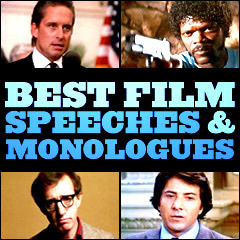|
Best Film Speeches and Monologues
|
|
Title Screen
|
Film Title/Year and Description of Film Speech/Monologue |
Screenshots
|
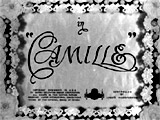
|
Camille (1936)
Screenwriter(s): Zoe Akins, Frances Marion, James Hilton
 Words
to a Dying Camille Words
to a Dying Camille
Armand Duval (Robert Taylor) made a promise to
Marguerite Gautier (Greta Garbo) as she died in his arms:
Shhh. Don't say such things, Marguerite,
even if we can't go to the country today. Think of how
happy we were once, how happy we shall be again. Think
of the day you found the four leaf clover, and all the
good luck it's going to bring us. Think of the vows we
heard Nichette and Gustave make and that we're going to
make to each other. This is for life Marguerite...
When he realized she had died, he sobbed:
Marguerite. Marguerite! No, don't leave
me. Marguerite, come back!
|
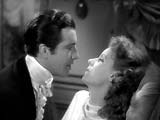

|
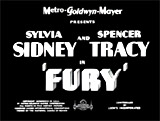
|
Fury (1936)
Screenwriter(s): Bartlett Cormack, Fritz Lang
 Vengeful
- Vindicated, and Finally Revealing Himself Vengeful
- Vindicated, and Finally Revealing Himself
In this expressionistic crime drama about mob
violence, Joe Wilson (Spencer Tracy) was wrongly-accused and
arrested on child kidnapping
charges - and jailed, because of circumstantial
evidence. While in his cell in the
small midwestern town of Strand, the jailhouse was set on fire
by a raging lynch mob, with Joe inside screaming for his
life, and he presumably was burned to death. However, he survived
and vowed to avenge his wrong-doing with a vengeful frame-up
of the lynchers, while everyone continued to presume that
he was dead.
At first, he made a sudden,
shadowy reappearance in a doorway at the apartment of his brothers
Charlie (Frank Albertson) and Tom (George Walcott), where he
recalled his escape from the jail when it was dynamited: ("I
could smell myself burn"). He vowed to avenge his wrong-doing
with a vengeful frame-up of the lynchers, while everyone continued
to presume that he was dead:
"I'm burned to death by
a mob of animals. I'm legally dead and they're legally murderers.
That I'm alive's not their fault. But I know 'em. I know a
lot of 'em and they'll hang for it, accordin' to the law which
says if you kill somebody, you gotta be killed yourself. But
I'll give 'em the chance they didn't give me. They'll get a
legal trial in a legal courtroom. They'll have a legal judge
and a legal defense. They'll get a legal sentence and a legal
DEATH!"
During a trial of the multiple lynch mob members
for first-degree murder, Joe hid out. The district
attorney projected newsreel film to provide "stop-action" conclusive
film evidence to identify the twenty-two individuals in the
mob who were complicit and guilty of the crime of the jail
'murder', after they had already given perjured testimony.
During the climactic ending
scene, Joe realized that his frame-up had gone far enough
and that he had become a vindictive, one-man 'lynch mob' himself.
He strode into the courtroom and addressed Judge Daniel
Hopkins (Frederick Burton) just before guilty verdicts were
to be read for the 22 convicted individuals - in the film's
final lines of dialogue:
"I
know that by coming here, I saved the lives of these twenty-two
people, but that isn't why I'm here. I don't care anything
about saving them. They're murderers. I know the law says they're
not because I'm still alive, but that's not their fault. And
the law doesn't know that a lot of things that were very important
to me, silly things maybe, like a belief in justice, and an
idea that men were civilized, and a feeling of pride that this
country of mine was different from all others. The law doesn't
know that those things were burned to death within me that
night. I came here today for my own sake. I couldn't stand
it anymore. I couldn't stop thinking about them with every
step and every breath I took, and I didn't believe Katherine
when she said... Katherine is the young lady who was going
to marry me. Maybe someday after I've paid for what I did,
they'll be a chance to begin again, and then maybe Katherine
and I..."
He turned to kiss and embrace Katherine as
the film ended on a hopeful and optimistic note. |
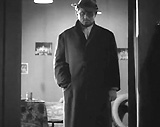
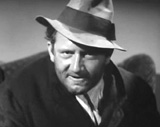

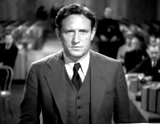
|
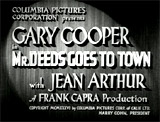
|
Mr. Deeds Goes
to Town (1936)
Screenwriter: Robert Riskin
 Peculiar
Behaviors Don't Make One Crazy Peculiar
Behaviors Don't Make One Crazy
In the final courtroom scene, tuba-playing Longfellow
Deeds (Gary Cooper) finally defended himself, pointing out
the peculiarities of others and of himself - he debunked the
charges against his tuba-playing:
About my playing the tuba. Seems like a
lot of fuss has been made about that. If, if a man's crazy
just because he plays the tuba, then somebody'd better
look into it, because there are a lot of tuba players running
around loose. 'Course, I don't see any harm in it. I play
mine whenever I want to concentrate. That may sound funny
to some people, but everybody does something silly when
they're thinking. For instance, the judge here is, is an
O-filler....An O-filler. You fill in all the spaces in
the O's with your pencil. I was watching him. (Laughter)
That may make you look a little crazy, your
Honor, just, just sitting around and filling in O's, but
I don't see anything wrong 'cause that helps you think. Other
people are doodlers....This is the piece of paper he was
scribbling on. I can't figure it out. One minute it looks
like a chimpanzee, and the next minute, it looks like a picture
of Mr. Cedar. You look at it, Judge. Exhibit A for the defense.
It looks kind of stupid, doesn't it, your Honor? But I guess
that's alright if Dr. Von Haller has to doodle to help him
think, that's his business. Everybody does something different.
Some people are ear-pullers, some are nail-biters. That Mr.
Semple over there is a nose-twitcher. (Laughter) And
the lady next to him is a knuckle-cracker. (Laughter)
So you see, everybody does silly things to help them think.
Well, I play the tuba.
|
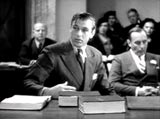
|

|
Mr. Deeds Goes
to Town (1936)
Screenwriter(s): Robert Riskin
 An
Argument for Philanthropy An
Argument for Philanthropy
Mr. Longfellow Deeds (Gary Cooper) then went
on to defend the "rather fantastic" charge that he
was giving away his entire fortune. He successfully argued
for noblesse oblige and philanthropy - those who had
money should help those who were the 'underdog':
From what I can see, no matter what system
of government we have, there will always be leaders and
always be followers. It's like the road out in front of
my house. It's on a steep hill. Every day I watch the cars
climbing up. Some go lickety-split up that hill on high,
some have to shift into second, and some sputter and shake
and slip back to the bottom again. Same cars, same gasoline,
yet some make it and some don't. And I say the fellas who
can make the hill on high should stop once in a while and
help those who can't. That's all I'm trying to do with
this money. Help the fellas who can't make the hill on
high. It's like I'm out in a big boat, and I see one fellow
in a rowboat who's tired of rowing and wants a free ride,
and another fellow who's drowning. Who would you expect
me to rescue? Mr. Cedar - who's just tired of rowing and
wants a free ride? Or those men out there who are drowning?
Any ten year old child will give you the answer to that.
|
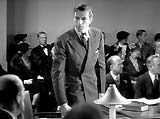
|
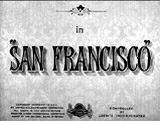
|
San Francisco (1936)
Screenwriter(s): Anita Loos
 San
Francisco: "The Wickedest City in the World" San
Francisco: "The Wickedest City in the World"
San Francisco's Nob Hill socialite Mrs. Burley
(Jessie Ralph), a former Irish immigrant washerwoman named
Maisie, advised singer Mary Blake (Jeanette MacDonald), to
try to win her over. She explained how she had a "Blackie
Norton" (the Clark Gable character in the film, a saloonkeeper
and gambler) in her own early life, but now understood that
Mary should marry her son Jack Burley (Jack Holt) for the future
of the city - otherwise, wickedness would continue:
They call this the wickedest city in the
world and it's a bitter shame, it is. For deep down underneath
all our evil and sin, we've got right here in San Francisco
the finest set of human bein's that was ever rounded up
on one spot. Sure, they had to have wild adventure in their
hearts and dynamite in their blood to set out for here
in the first place. That's why they're so full of untamed
deviltry now!
But we can't go on like this. Sinful and blasphemous,
with no fear for God in our hearts. That's the reason why
I want my boy to have a good woman near him, and raise fine,
beautiful kids for the glory of our heritage. You can make
a fine man of him. And maybe one day, you'll be proud that
you met up with the family of old Maisie Burley, the washerwoman.
|

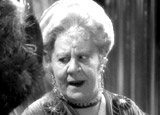
|
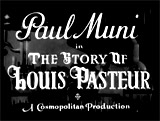
|
The Story of Louis Pasteur (1936)
Screenwriter(s): Sheridan Gibney, Pierre Collings
 An
Exhortation to One's Students To Not Be Discouraged by Skepticism
and Opposition An
Exhortation to One's Students To Not Be Discouraged by Skepticism
and Opposition
In the film's last lines, vindicated French chemist
and microbiologist Dr. Louis Pasteur (Paul Muni) addressed
students at the Academy of Medicine:
You young men - doctors and scientists of
the future - do not let yourselves be tainted by apparent
skepticism, nor discouraged by the sadness of certain hours
that creep over nations. Do not become angry at your opponents,
for no scientific theory has ever been accepted without
opposition. Live in the serene peace of libraries and laboratories.
Say to yourselves, first, 'What have I done for my instruction?'
And as you gradually advance, 'What am I accomplishing?'
Until the time comes when you may have the immense happiness
of thinking that you have contributed in some way to the
welfare and progress of mankind.
|
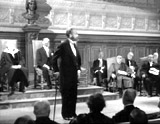
|
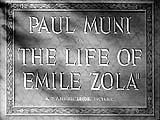
|
The Life of Emile Zola (1937)
Screenwriter(s): Norman Reilly Raine, Heinz Herald, Geza Herczeg
 Charges
of Cover-Up and Corruption: "The Truth is On the March
and Nothing Will Stop It" Charges
of Cover-Up and Corruption: "The Truth is On the March
and Nothing Will Stop It"
Play clip (excerpt): 
Firebrand Emile Zola (Paul Muni) asserted his
truthfulness (and risked libel) as he brought charges of Army
corruption, cover-up and injustice, in an open letter to the
President of France, about the "abominable Dreyfus affair" (which
acquitted spy Major Walsin-Esterhazy and convicted instead
scapegoated and innocent Jewish Captain Dreyfus). His letter
contained a series of famous "I Accuse" statements:
Mr. President of the Republic. Permit me
to tell you that your record without blame so far is threatened
with a most shameful blot - this abominable Dreyfus affair.
A court-martial has recently, by order, dared to acquit
one Esterhazy, a supreme slap at all truth, all justice.
But since they have dared, I too shall dare. I shall tell
the truth. Because if I did not, my nights would be haunted
by the specter of an innocent being expiating, under the
most frightful torture, a crime he never committed.
It is impossible for honest people to read
the iniquitous bill of accusation against Dreyfus without
being overcome with indignation and crying out their revulsion.
Dreyfus knows several languages - crime. He works hard -
crime. No compromising papers are found in his apartment
- crime. He goes occasionally to the country of his origin
- crime. He endeavors to learn everything - crime. He's not
easily worried - crime. He is easily worried - also a crime.
The Minister of War, the Chief of the General Staff and the
Assistant Chief never doubted that the famous Boudreaux was
written by Esterhazy. But, the condemnation of Esterhazy
involved revision of the Dreyfus verdict. And that, the General
Staff wished to avoid at all cost.
For over a year, the Minister of War and the
General Staff have known that Dreyfus is innocent, but they've
kept this knowledge to themselves. And those men sleep, and
they have wives and children they love. One speaks of the
'honor of the Army.' The Army is the people of France themselves.
And the Dreyfus affair is a matter pertaining to that Army.
Dreyfus cannot be vindicated without condemning the whole
General Staff. That is why the General Staff has screened
Esterhazy, to demolish Dreyfus once more.
Such, then, Mr. President, is the simple truth.
It is a fearful truth. But I affirm with intense conviction
- the truth is on the march, and nothing will stop it. Mr.
President.
I accuse Colonel Dort of having been the diabolical
agent of the affair, of continuing to defend his deadly work
through three years of revolting machinations.
I accuse the Minister of War of having concealed decisive proofs
of the innocence of Dreyfus.
I accuse the Chief of Staff and the Assistant Chief of Staff
of being accomplices in the same crime.
I accuse the Commander of the Paris garrison of the most monstrous
partiality.
I accuse the War Office of having viciously led a campaign
to misdirect public opinion and cover up its sins.
I accuse the first court-martial of violating all human rights
and condemning a prisoner on testimony kept secret from him.
And finally, I accuse the Esterhazy court-martial of covering
up this illegality by order, thus, in turn, committing the
judicial crime of acquitting a guilty man.
In making these accusations, I am aware that
I render myself open to prosecution for libel. But, that
does not matter. The action I take is designed only to hasten
the explosion of truth and justice. Let there be a trial
in the full light of day! I am waiting.
|
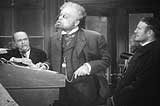
|

|
The Life of Emile Zola (1937)
Screenwriter(s): Norman Reilly Raine, Heinz Herald,
Geza Herczeg
 Defense
of Captain Dreyfus by Emile Zola - "I Swear That Dreyfus
Is Innocent" Defense
of Captain Dreyfus by Emile Zola - "I Swear That Dreyfus
Is Innocent"
Play clip (excerpt): 
Emile Zola (Paul Muni) delivered an inspiring
and impassioned closing argument to the jury in defense of
himself and Captain Dreyfus (Joseph Schildkraut), a scapegoated
and innocent Jewish army officer for a breach in security -
framed for an espionage crime he did not commit and imprisoned
on Devil's Island in French Guyana:
...But from my struggling youth until today,
my principal aim has been to strive for truth. That is
why I entered this fight. All my friends have told me that
it was insane for a single person to oppose the immense
machinery of the law, the glory of the Army, and the power
of the State. They warned me that my actions would be mercilessly
crushed, that I would be destroyed. But what does it matter
if an individual is shattered, if only justice is resurrected?
It has been said that the State summoned me
to this Court. That is not true. I am here because I wished
it. I, alone, have chosen you as my judges. I, alone, decided
that this abominable affair should see the light, so that
France might at last know all, and voice her opinion. My
act has no other object. My person is of no account. I'm
satisfied. But my confidence in you was not shared by the
State. They did not dare say all about the whole undividable
affair and submit it to your verdict. That is no fault of
mine. You saw for yourselves how my defense was incessantly
silenced. Gentlemen, I know you. You are the heart, the intellect
of my beloved Paris, where I was born and which I've studied
for 40 years. I see you with your families under the evening
lamp. I accompany you into your factories, your shops. You're
all workers and righteous men. You will not say like many,
'What does it matter if an innocent man is undergoing torture
on Devil's Island? Is the suffering of one obscure person
worth the disturbance of a great country?' Perhaps though,
you've been told that by punishing me, you will stop a campaign
that is injurious to France.
Gentlemen, if that is your idea, you are mistaken.
Look at me. Have I the look of a hireling, a liar, a traitor?
I'm only a free writer who has given his life to work, and
who will resume it tomorrow. And I am not here defending
myself! Tremendous pressure has been put upon you. 'Save
the army!' 'Convict Zola and save France!' I say to you,
pick up that challenge! Save the army!! And save France.
But do it by letting truth conquer. Not only is an innocent
man crying out for justice, but more - much more - a great
nation is in desperate danger of forfeiting her honor. Do
not take upon yourselves a fault - the burden of which you
will forever bear in history. A judicial blunder has been
committed! The condemnation of an innocent man induced the
acquittal of a guilty man.
And now, today, you're asked to condemn me
because I rebelled on seeing our country embarked on this
terrible course. At this solemn moment in the presence of
this tribunal, which is the representative of human justice,
before you gentlemen of the jury, before France, before the
whole world, I swear that Dreyfus is innocent. By my 40 years
of work, by all that I have won, by all that I have written
to spread the spirit of France, I swear that Dreyfus is innocent.
May all that melt away. May my name perish if Dreyfus be
not innocent. He is innocent.
|

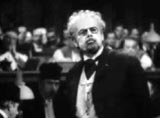
|

|
The Life of Emile Zola (1937)
Screenwriter(s): Norman Reilly Raine, Heinz Herald,
Geza Herczeg
 Eulogy
for Emile Zola: "Let Us Not Mourn Him...Let Us Envy
Him" Eulogy
for Emile Zola: "Let Us Not Mourn Him...Let Us Envy
Him"
Play clip (excerpt): 
Novelist Anatole France (Morris Carnovsky)
presented a stirring eulogy on October 5, 1902 for
his friend 62 year-old Emile Zola, who tragically died of carbon
monoxide poisoning a few days earlier. He was found in the
bedroom of his Paris apartment, asphyxiated by the fumes of
a defective fireplace. Rampant rumors of murder were never
proven:
Let us not mourn him. Let us rather salute
that bright spirit of his which will live forever, and
like a torch, enlighten a younger generation inspired to
follow him. You who are enjoying today's freedom, take
to your hearts the words of Zola. Do not forget those who
fought the battles for you and bought your liberty with
their genius and their blood. Do not forget them and applaud
the lies of fanatical intolerance. Be human. For no man
in all the breadth of our land more fervently loved humanity
than Zola. He had the simplicity of a great soul. He was
enjoying the fruits of his labor -- fame, wealth, security
-- when suddenly, out of his own free will, he tore himself
from all the peaceful pleasures of his life, from the work
he loved so much because he knew that there is no serenity
save injustice; no repose save in truth.
At the sound of his brave words, France awakened
from her sleep. How admirable is the genius of our country.
How beautiful the soul of France which for centuries taught
right and justice to Europe and the world. France is once
again today the land of reason and benevolence because one
of her sons, through an immense work and a great action,
gave rise to a new order of things based on justice and the
rights common to all men. Let us not pity him because he
suffered and endured. Let us envy him. Let us envy him because
his great heart won him the proudest of destinies: He was
a moment of the conscience of man.
|
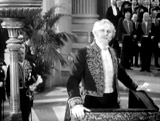
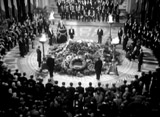
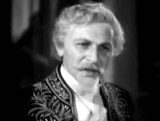
|
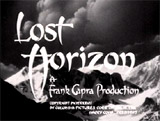
|
Lost Horizon (1937)
Screenwriter(s): Robert Riskin, Sidney Buchman (uncredited)
 The
Purpose of Shangri-La The
Purpose of Shangri-La
The elderly High Priest or Lama (Sam Jaffe) described
the pacifistic mission behind Shangri-La, an alpine Eden, while
introducing young newcomer, British diplomat Robert Conway
(Ronald Colman) to its mysteries where time had virtually stopped.
Conway asked for a "reason" explaining why his life
should go on and on. With a world destined to be destroyed
by wars, violence, and lust for power and domination (World
War II was looming), the High Priest explained that Shangri-La
was created as a sanctuary for civilization's rare treasures
- ready to step in with "new life" after apocalyptic
annihilation:
We have reason. It is the entire meaning
and purpose of Shangri-La. It came to me in a vision long,
long ago. I saw all the nations strengthening, not in wisdom,
but in the vulgar passions and the will to destroy. I saw
their machine power multiplying until a single weaponed
man might match a whole army. I foresaw a time when man
exulting in the technique of murder, would rage so hotly
over the world, that every book, every treasure would be
doomed to destruction. This vision was so vivid and so
moving that I determined to gather together all things
of beauty and culture that I could and preserve them here
against the doom toward which the world is rushing. Look
at the world today. Is there anything more pitiful? What
madness there is! What blindness! What unintelligent leadership!
A scurrying mass of bewildered humanity crashing headlong
against each other, compelled by an orgy of greed and brutality.
The time must come, my friend, when this orgy will spend
itself, when brutality and the lust for power must perish
by its own sword.
Against that time is why I avoided death and
am here and why you were brought here. For when that
day comes, the world must begin to look for a new life. And
it is our hope that they may find it here. For here, we shall
be with their books and their music and the way of life based
on one simple rule: Be kind. When that day comes, it is our
hope that the brotherly love of Shangri-La will spread throughout
the world. Yes, my son, when the strong have devoured each
other, the Christian ethic may at last be fulfilled, and
the meek shall inherit the Earth. (The High Lama stood,
smiling with a broad, toothless grin)
|
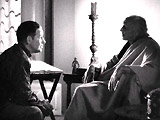
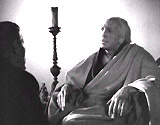
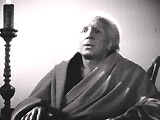
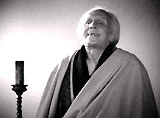
|

|
Lost Horizon (1937)
Screenwriter(s): Robert Riskin, Sidney Buchman (uncredited)
 "There's
A Wish For Shangri-La in Everyone's Heart" "There's
A Wish For Shangri-La in Everyone's Heart"
Orphaned after her explorer-parents died during
a lost expedition in the "wild country beyond the pass," 30
year-old Sondra (Jane Wyatt) described how she was brought
up at Shangri-La, and the aging process had slowed. She spoke
to world-weary Robert Conway (Ronald Colman) who was still
astounded by the promise of life at Shangri-La and his feelings
of deja-vu, as they talked in a cherry-blossoming orchard:
Perhaps because you've always been a part
of Shangri-La without knowing it... I'm sure of it, just
as I'm sure there's a wish for Shangri-La in everyone's
heart. I've never seen the outside world, but I understand
there are millions and millions of people who are supposed
to be mean and greedy. And I just know that secretly, they
are all hoping to find a garden spot where there is peace,
security, where there's beauty and comfort, where they
wouldn't have to be mean and greedy. Oh, I just wish the
whole world might come to this valley.
|
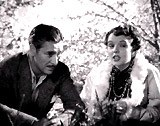
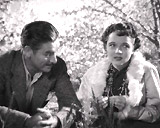
|

|
Stage Door (1937)
Screenwriter(s): Morrie Ryskind, Anthony Veiller
 "The
Calla Lilies Are in Bloom Again" "The
Calla Lilies Are in Bloom Again"
Rich/refined actress Terry Randall (Katharine
Hepburn) performed on stage after her friend Kaye's (Andrea
Leeds) suicide:
The calla lilies are in bloom again. Such
a strange flower, suitable to any occasion. I carried them
on my wedding day, and now I place them here in memory
of something that has died...Have you gathered here to
mourn, or are you here to bring me comfort?...(She touched
the ring on her finger given to her by Kaye) I've learned
something about love that I never knew before. That I never
knew before. You speak of love when it's too late. Help
should come to people when they need it. Why are we always
so helpful to each other when it's no longer any use?...This
is my home. This is where I belong. Love was in this house
once, and for me it will always be here, nowhere else...One
should always listen closely when people say goodbye because
sometimes they're, they're really saying farewell.
This speech was followed by her equally moving
curtain call eulogy speech to modestly give tribute to Kaye. |

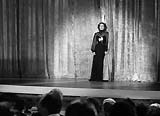
|
